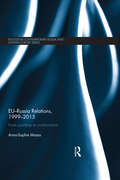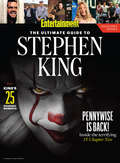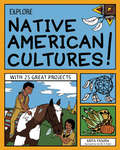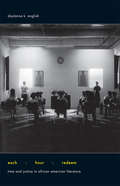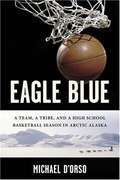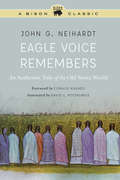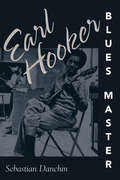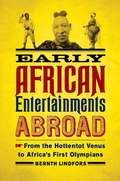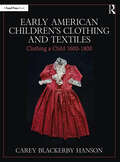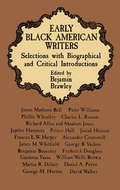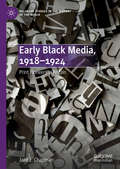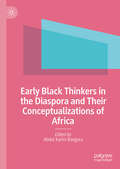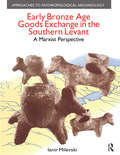- Table View
- List View
EU-Japan Relations, 1970-2012: From Confrontation to Global Partnership (Routledge Contemporary Japan Series)
by Dimitri Vanoverbeke Franz Waldenberger Jörn KeckThis book presents a comprehensive overview of EU-Japan relations from 1970 to the present. It charts developments over the period, analyses key specific areas of importance to the relationship, and concludes by assessing how the relationship is likely to develop going forward. Throughout, the book discusses the factors on both sides which motivate the relationship, including Japan’s concern to secure markets for its advanced industrial products, and the factors motivating current negotiations for a deeper and more comprehensive economic and cooperative partnership.
EU-Russia Relations, 1999-2015: From Courtship to Confrontation (Routledge Contemporary Russia and Eastern Europe Series)
by Anna-Sophie MaassThis book traces the development of EU-Russia relations in recent years. It argues that a major factor influencing the relationship is the changing internal dynamics of both parties, in Russia’s case an increasingly authoritarian state, in the case of the EU an increasing coherence in its foreign policy as applied to former Soviet countries which Russia regarded as interference in its own sphere. The book considers the impact of conflicts in Kosovo, Chechnya, Georgia and Ukraine, discusses the changing internal situation in both Russia and the EU, including the difficulties in overcoming fragmentation in EU policy-making, and concludes by assessing how the situation is likely to develop.
EU-Russian Border Security: Challenges, (Mis)Perceptions and Responses (Routledge Contemporary Russia and Eastern Europe Series)
by Serghei GolunovThe land border between Russia and the European Union is one of the longest land borders in the world, with very considerable trade flowing across the border in both directions. This book examines the nature of the EU-Russia border, and the issues connected with its management. It describes the territories and the societies on each side of the border, discusses the challenges which confront border management, including migration and criminal activities, and explores how people on both sides perceive each other and perceive threats and security issues. It concludes by assessing achievements to date in managing the border and by assessing continuing unresolved challenges.
EU-Turkey Relations in the 21st Century (Routledge Studies in Middle Eastern Politics)
by Birol YesiladaThe possibility of Turkey’s accession to the European Union has been problematic. Initially, the EU’s pursuit of regional economic integration and enlargement of membership, at the exclusion of Turkey, strained relations between the two. It was not until 1999, and under pressure from the US, that Turkey was considered as a potential candidate for membership. This book seeks to provide a comprehensive assessment of the fluctuating relations between the EU and Turkey in the twenty-first century. Applying complementary theoretical models to evaluate prospects for Turkey’s membership, analysis includes; Turkey’s report card on the Copenhagen criteria, public opinion in Europe and Turkey, and benefits and challenges based on projection estimates. The results show that whilst both sides stand to make significant gains from Turkey’s membership, the current state of affairs point in the direction of a failure. Examining complex issues surrounding EU-Turkey relations and addressing the critical question of what will happen if Turkey is rejected by the EU, this book will be of interest to students and scholars of politics, Turkey and the wider Middle East.
EU-UK Police and Judicial Cooperation in Criminal Matters (St Antony's Series)
by Mirena PenchevaThis book looks at the past, present and possible future relationship between the EU and the UK in the fields of law enforcement and judicial cooperation in criminal matters. It examines successively the EU-UK relationship prior to 1 February 2020; the relationship during the transition period; the relationship after the end of the transition period. The book analyses the relevant provisions of the Withdrawal Agreement, the Political Declaration, of the EU and UK negotiating mandates and draft legal texts, and the state of play of the negotiations. It looks at the possible forms that the future cooperation can take and the likely areas, which might be covered, such as cooperation with Europol and Eurojust; criminal records; DNA, dactyloscopic and vehicle registration data; passenger name records; surrender procedures, and mutual legal assistance. It also analyses the overarching issues of protection of personal data and the future role of the Court of Justice of the EU. Finally, this book puts forward some ideas on the possible impact of Brexit on security cooperation within wider Europe and on the possible emergence in future of a European Security Union within wider Europe. The volume is aimed at practitioners and academics in European Studies, International Relations, and Law.
EW The Ultimate Guide to Stephen King
by The Editors of Entertainment WeeklyEntertainment Weekly presents The Ultimate Guide to Stephen King.
EXPLORE NATIVE AMERICAN CULTURES!
by Anita Yasuda Jennifer KellerExplore Native American Cultures! with 25 Great Projects introduces readers to seven main Native American cultural regions, from the northeast woodlands to the Northwest tribes. It encourages readers to investigate the daily activities-including the rituals, beliefs, and longstanding traditions-of America's First People. Where did they live? How did they learn to survive and build thriving communities? This book also investigates the negative impact European explorers and settlers had on Native Americans, giving readers a glimpse into the complicated history of Native Americans.Readers will enjoy the fascinating stories about America's First People as leaders, inventors, diplomats, and artists. To enrich the historical information, hands-on activities bring to life each region's traditions, including region-specific festivals, technology, and art. Readers can learn Native American sign language and create a salt dough map of the Native American regions. Each project is outlined with clear step-by-step instructions and diagrams, and requires minimal adult supervision.
EXPLORER ACADEMY VELA: THE UNBREAKABLE BOND BOOK 2
by Trudi TrueitIn this suspenseful sequel to The Sailor Cipher, Sailor York must learn to control her extraordinary ability to communicate with animals to save her sister—and the planet. The deadly animal-smuggling ring Hydrus is at it again: They’ve created a high-tech device that lures animals to be captured and sold. Sailor and her Explorer Academy friends Lani, Cruz, and Emmett—aka the Vela Squad—are determined to stop Hydrus at any cost. Their secret weapon? Sailor’s mysterious powers, which she is still learning how to use, all the while juggling their most challenging semester at Explorer Academy yet! To add to the pressure, it’s not just animals’ lives at stake, but the life of Sailor’s missing sister, Keel. Following a trail of clues around the globe leads the Vela Squad to an astounding discovery and daring race against the clock. In the end, their courage—and everything they thought they knew about Explorer Academy—will be put to the test.
Each Hour Redeem: Time and Justice in African American Literature
by Daylanne K. EnglishEach Hour Redeem advances a major reinterpretation of African American literature from the late eighteenth century to the present by demonstrating how its authors are centrally concerned with racially different experiences of time. Daylanne K. English argues that, from Phillis Wheatley to Suzan-Lori Parks, African American writers have depicted distinctive forms of temporality to challenge racial injustices supported by dominant ideas of time. The first book to explore the representation of time throughout the African American literary canon, Each Hour Redeem illuminates how the pervasive and potent tropes of timekeeping provide the basis for an overarching new understanding of the tradition.Combing literary, historical, legal, and philosophical approaches, Each Hour Redeem examines a wide range of genres, including poetry, fiction, drama, slave narratives, and other forms of nonfiction. English shows that much of African American literature is characterized by &“strategic anachronism,&” the use of prior literary forms to investigate contemporary political realities, as seen in Walter Mosley&’s recent turn to hard-boiled detective fiction. By contrast, &“strategic presentism&” is exemplified in the Black Arts Movement and the Harlem Renaissance and their investment in contemporary political potentialities, for example, in Langston Hughes and Amiri Baraka&’s adaptation of the jazz of their eras for poetic form and content. Overall, the book effectively demonstrates how African American writers have employed multiple and complex conceptions of time not only to trace racial injustice but also to help construct a powerful literary tradition across the centuries.
Eagle Blue: A Team, a Tribe, and a High School Basketball Season in Arctic Alaska
by Michael D'OrsoFort Yukon, Alaska, which was colonized by Athabascan Natives, exists in the margins of American culture. The tiny population and fading traditions of this town have one strong link to America: their high school basketball team.
Eagle Voice Remembers: An Authentic Tale of the Old Sioux World
by John G. Neihardt&“[Eagle Voice Remembers] is John Neihardt&’s mature and reflective interpretation of the old Sioux way of life. He served as a translator of the Sioux past, whose audience has proved not to be limited by space or time. Through Neihardt&’s writings Black Elk, Eagle Elk, and other old men who were of that last generation of Sioux to have participated in the old buffalo-hunting life and the disorienting period of strife with the U.S. Army found a literary voice. What they say chronicles a dramatic transition in the life of the Plains Indians; the record of their thoughts, interpreted by Neihardt, is a legacy preserved for the future. It transcends the specifics of this one tragic case of cultural misunderstanding and conflict and speaks to universal human concerns. It is a story worth contemplating both for itself and for the lessons it teaches all humanity.&”—from the introduction by Raymond J. DeMallie In her foreword Coralie Hughes discusses John G. Neihardt&’s intention that this book, formerly titled When the Tree Flowered, be understood as a prequel to his classic Black Elk Speaks. In this new edition David C. Posthumus adds clarity through his annotations, introducing Eagle Voice Remembers to a new generation of readers and presenting a fresh understanding for fans of the original.
Ear Economy: China Audio Streaming Programs Study
by Ying HuangThis book sheds light on the overall description and explanation of the current socio-political, economic and cultural environment concerning the development of China's audio streaming programs industry. It interprets the emergence of the “ear economy” through the subjects of media ecology, media psychology, communication studies and cultural criticism, media industrial studies, sociology and anthropology. The book skillfully weaves together historical, cultural, and industry studies, along with textual and critical discourse analysis. This interdisciplinary work contributes to multiple academic fields including literary and cultural studies, media and communication studies, China/Asia studies, and political theory.
Earl Hooker, Blues Master (American Made Music Series)
by Sebastian Danchin2020 Blues Hall of Fame Classic of Blues LiteratureJimi Hendrix called Earl Hooker “the master of the wah-wah pedal.” Buddy Guy slept with one of Hooker's slides beneath his pillow hoping to tap some of the elder bluesman's power. And B. B. King has said repeatedly that, for his money, Hooker was the best guitar player he ever met. Tragically, Earl Hooker died of tuberculosis in 1970 when he was on the verge of international success just as the Blues Revival of the late sixties and early seventies was reaching full volume. Second cousin to now-famous bluesman John Lee Hooker, Earl Hooker was born in Mississippi in 1929, and reared in black South Side Chicago where his parents settled in 1930. From the late 1940s on, he was recognized as the most creative electric blues guitarist of his generation. He was a “musician's musician,” defining the art of blues slide guitar and playing in sessions and shows with blues greats Muddy Waters, Junior Wells, and B. B. King. A favorite of black club and neighborhood bar audiences in the Midwest, and a seasoned entertainer in the rural states of the Deep South, Hooker spent over twenty-five years of his short existence burning up U.S. highways, making brilliant appearances wherever he played. Until the last year of his life, Hooker had only a few singles on obscure labels to show for all the hard work. The situation changed in his last few months when his following expanded dramatically. Droves of young whites were seeking American blues tunes and causing a blues album boom. When he died, his star's rise was extinguished. Known primarily as a guitarist rather than a vocalist, Hooker did not leave a songbook for his biographer to mine. Only his peers remained to praise his talent and pass on his legend. “Earl Hooker's life may tell us a lot about the blues,” biographer Sebastian Danchin says, “but it also tells us a great deal about his milieu. This book documents the culture of the ghetto through the example of a central character, someone who is to be regarded as a catalyst of the characteristic traits of his community.” Like the tales of so many other unheralded talents among bluesmen, Earl Hooker, Blues Master, Hooker's life story, has all the elements of a great blues song—late nights, long roads, poverty, trouble, and a soul-felt pining for what could have been.
Early African Entertainments Abroad
by Bernth LindforsIn the nineteenth and early twentieth centuries African and pseudo-African performers were displayed as curiosities throughout Europe and America. Appearing in circuses, ethnographic exhibitions, and traveling shows, these individuals and troupes drew large crowds. As Bernth Lindfors shows, the showmen, impresarios, and even scientists who brought supposedly representative inhabitants of the "Dark Continent" to a gaping public often selected the performers for their sensational impact. Spotlighting and exaggerating physical, mental, or cultural differences, the resulting displays reinforced pernicious racial stereotypes and left a disturbing legacy. Using period illustrations and texts, "Early African Entertainments Abroad" illuminates the mindset of the era's largely white audiences as they viewed wax models of Africans with tails and watched athletic competitions showcasing hungry cannibals. White spectators were thus assured of their racial superiority. And blacks were made to appear less than fully human precisely at the time when abolitionists were fighting to end slavery and establish equality. "
Early American Cartographies
by Martin BrücknerMaps were at the heart of cultural life in the Americas from before colonization to the formation of modern nation-states. The fourteen essays in Early American Cartographies examine indigenous and European peoples' creation and use of maps to better represent and understand the world they inhabited. Drawing from both current historical interpretations and new interdisciplinary perspectives, this collection provides diverse approaches to understanding the multilayered exchanges that went into creating cartographic knowledge in and about the Americas. In the introduction, editor Martin Bruckner provides a critical assessment of the concept of cartography and of the historiography of maps. The individual essays, then, range widely over space and place, from the imperial reach of Iberian and British cartography to indigenous conceptualizations, including "dirty," ephemeral maps and star charts, to demonstrate that pre-nineteenth-century American cartography was at once a multiform and multicultural affair. This volume not only highlights the collaborative genesis of cartographic knowledge about the early Americas; the essays also bring to light original archives and innovative methodologies for investigating spatial relations among peoples in the western hemisphere. Taken together, the authors reveal the roles of early American cartographies in shaping popular notions of national space, informing visual perception, animating literary imagination, and structuring the political history of Anglo- and Ibero-America.The contributors are: Martin Bruckner, University of Delaware Michael J. Drexler, Bucknell UniversityMatthew H. Edney, University of Southern MaineJess Edwards, Manchester Metropolitan UniversityJunia Ferreira Furtado, Universidade Federal de Minas Gerais, BrazilWilliam Gustav Gartner, University of Wisconsin-MadisonGavin Hollis, Hunter College of the City University of New YorkScott Lehman, independent scholarKen MacMillan, University of CalgaryBarbara E. Mundy, Fordham UniversityAndrew Newman, Stony Brook UniversityRicardo Padron, University of VirginiaJudith Ridner, Mississippi State University
Early American Children’s Clothing and Textiles: Clothing a Child 1600-1800
by Carey Blackerby HansonEarly American Children’s Clothing and Textiles: Clothing a Child 1600–1800 explores the life experiences of Indigenous, Anglo-European, African, and mixed-race children in colonial America, their connections to textile production, the process of textile production, the textiles created, and the clothing they wore. The book examines the communities and social structure of early America, the progression of the colonial textile industry, and the politics surrounding textile production beginning in the 1600's, with particular focus on the tasks children were given in the development of the American textile industry. The book discusses the concept of childhood in society during this time, together with documented stories of individual children. The discussion of early American childhood and textile production is followed by extant clothing samples for both boys and girls, ranging from Upper-class children's wear to children's wear of those with more humble means. With over 180 illustrations, the book includes images of textile production tools, inventions, and practices, extant textile samples, period portraits of children, and handmade extant clothing items worn by children during this time period. Early American Children’s Clothing and Textiles: Clothing a Child 1600–1800 will be of interest to working costume designers and technicians looking for primary historical and visual information for Early American productions, costume design historians, early American historians, students of costume design, and historical re-enactment costume designers, technicians, and hobbyists.
Early American Civilizations: Activity Book (Amplify Core Knowledge Language Arts, Grade 5 #Unit 2)
by Amplify EducationNIMAC-sourced textbook
Early American Civilizations: Reader (Amplify Core Knowledge Language Arts, Grade 5 #Unit 2)
by Amplify EducationNIMAC-sourced textbook
Early American History To 1877: An Interactive Text
by Linda Rhoades-SwartzThe thirteen chapters of the book, Early American History to 1877 An Interactive Text include, Native Americans and Exploration, Colonial Settlement and Colonial Slavery, Life in Colonial America, The French and Indian War: Prelude to Revolution, The American Revolution, Creating a Nation, Our First Leaders: Washington and Adams, New Century for an Emerging Power: Jefferson to John Quincy Adams, The Rise of a National Culture, The Age of Jackson and the Rise of the Whig Party, The Era of Manifest Destiny: Tyler to Fillmore, The Coming of the Civil War, The Civil War and Reconstruction. Every chapter has its summary and to know more details, all the chapters contain an Introduction, Essay, Suggested Readings, Suggested Websites, and Questions to Ponder.
Early Asceticism in India: Ājīvikism and Jainism (Routledge Advances in Jaina Studies)
by Piotr BalcerowiczĀjīvikism was once ranked one of the most important religions in India between the 4th and 2nd centuries BCE, after Buddhism, ‘Brahmanism’ and before Jainism, but is now a forgotten Indian religion. However, Jainism has remained an integral part of the religious landscape of South Asia, despite the common beginnings shared with Ājīvikism. By rediscovering, reconstructing, and examining the Ājīvikism doctrine, its art, origins and development, this book provides new insight into Ājīvikism, and discusses how this information enables us to better understand its impact on Jainism and its role in the development of Indian religion and philosophy. This book explains how, why and when Jainism developed its strikingly unique logic and epistemology and what historical and doctrinal factors prompted the ideas which later led to the formulation of the doctrine of multiplexity of reality (anekānta-vāda). It also provides answers to difficult passages of Buddhist Sāmañña-phala-sutta that baffled both Buddhist commentators and modern researchers. Offering clearer perspectives on the origins of Jainism the book will be an invaluable contribution to Jaina Studies, Asian Religion and Religious History.
Early Black American Writers
by Benjamin BrawleyEveryone is familiar with the rhetoric of reform and humanism, written by whites, which did much to inflame the nation to the point of civil war. Who spoke for the black man during this crucial period of his history? How did he see the issues which bore so directly on himself and his race — present and future? How did he feel about them?In this anthology, the black man speaks for himself. Beginning with the earliest published work of a black American, selections in this volume cover the period from 1761 through the Civil War years. Varying greatly in education and technical skill, from self-taught slave to college-trained scholar, the writers in this collection did much to shape the developing culture of black America. Professor Brawley prefaces each selection with a biographical account of its author, and with sympathetic but objective critical analysis of the work presented. His introduction gives a valuable overview of black literature in this early period, telling the reader who black writers were and describing the issues — political, social, and moral — that concerned them.Included are selections from the work of Jupiter Hammon, Gustavus Vassa, Phillis Wheatley, W. W. Brown, F. E. W. Harper, and many others as yet less known. Whether writing about religion, slavery, military service, voting rights, or the colonization of Liberia, these writers merit attention on both artistic and historical grounds. Brawley's historical and literary insights guide readers to a full appreciation of these works. A lamentable gap in knowledge of the black experience is filled by this anthology; it should be read by all students of history and literature.
Early Black Media, 1918–1924: Print Pioneers in Britain (Palgrave Studies in the History of the Media)
by Jane L. ChapmanThis book represents the first systematic attempt to analyse media and public communications published in Britain by people of African and Afro-Caribbean origin during the aftermaths of war, presenting an in-depth study of print publications for the period 1919-1924. This was a period of post-conflict readjustment that experienced a transnational surge in special interest newspapers and periodicals, including visual discourse. This study provides evidence that the aftermath of war needs to be given more attention as a distinctly defined period of post-conflict adjustment in which individual voices should be highlighted. As such it forms part of a continuing imperative to re-discover and recuperate black history, adding to the body of research on the aftermaths of The First World War, black studies, and the origins of diaspora.Jane L. Chapman analyses how the newspapers of black communities act as a record of conflict memory, and specifically how physical and political oppression was understood by members of the African Caribbean community. Pioneering black activist journalism demonstrates opinions on either empowerment or disempowerment, visibility, self-esteem, and economic struggles for survival.
Early Black Thinkers in the Diaspora and Their Conceptualizations of Africa
by Abdul Karim BanguraThis book argues that just as the ideas of Pan-Africanism birthed by Henry Sylvester-Williams and others in the late 1800s and Negritude ushered by Aimé Césaire and others in the early 1900s emboldened many major Black thinkers to push for independence across Africa, so will these early thinkers’ ideas help in the building of a new Africa. The various chapters explore the proposition that the thoughts of early great Diaspora Black thinkers are still wellsprings of tenets that can be used to build a new Africa. The chapters examine how these thinkers conceptualized Africa in their works, with the main objective of delineating their conceptualizations to generate suggestions on how to build a new Africa.
Early British Socialism and the ‘Religion of the New Moral World’ (Palgrave Studies in Utopianism)
by Edward LucasThis book challenges existing accounts of the role of religion in early-nineteenth-century British socialism. Against scholarly interpretations which have identified Owenite socialists as anti-religious or as imitating Christianity, this book argues that Owenites offer a re-conception of the nature of ‘religion’ as advanced through knowledge of the natural and social world, as a prospective source of solidarity which could serve as the unifying bond for communities, and as constituted by ethical conduct. It shows how this re-conception was formed through a sincere and considered reflection upon the problem of religious truth and was shaped by the particular religious context of early-nineteenth-century Britain. It then demonstrates the importance of this reimagination of religion to their understanding of socialism. Their religious interests were not an eccentric adornment to their socialism, an outdated residue yet to be shed and encumbering the development of a mature socialism, or merely instrumental to their temporal goals. Instead, Owenite ambitions of religious reform were grounded in the philosophical preoccupations which animated their socialism.
Early Bronze Age Goods Exchange in the Southern Levant: A Marxist Perspective (Approaches To Anthropological Archaeology Ser.)
by Ianir MilevskiThe Southern Levant was a thriving centre of religious and cultural exchange during the Bronze Age. 'Early Bronze Age Goods Exchange in the Southern Levant' provides an overview of the sources and distribution of commodities. The book presents a study of key production centres and the process of purchase and exchange. The book establishes a theoretical framework - based in political economy, ethnoarchaeology and economic anthropology - for understanding the exchange of commodities in a precapitalist society. 'Early Bronze Age Goods Exchange in the Southern Levant' is unique in presenting archaeological sources and prehistoric economics through modern, notably Marxist, theories of human development.

